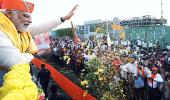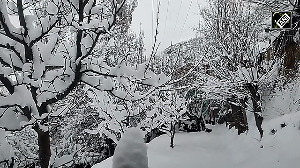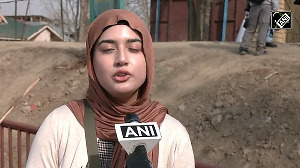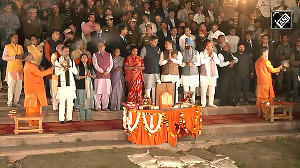As the Union Cabinet on Wednesday accepted a high-level panel's recommendations for holding simultaneous polls for the Lok Sabha, state assemblies and local bodies in a phased manner after a countrywide consensus-building exercise, here is a look at what has happened so far:

IMAGE: Former President Ram Nath Kovind, head of the high-level committee on 'One Nation, One Election', presents the report to President Droupadi Murmu, at Rashtrapati Bhavan, in New Delhi on March 14, 2024. Photograph: ANI Photo
- In India, simultaneous elections to the Lok Sabha (House of the People) and Vidhan Sabhas (state legislative assemblies) were held in 1951-52, 1957, 1962 and 1967.
- The first general election under the new Constitution was held between October 1951 and May 1952, featuring a three-tiered process electing the president and vice-president, members of the Lower Houses at the Centre and in the states, and members of the Upper Houses.
- The second general election to the Lok Sabha and state legislative assemblies was completed on time by March 1957. In order to hold the Lok Sabha and assembly polls simultaneously, the assemblies of Bihar, Bombay, Madras, Mysore, Punjab, Uttar Pradesh and West Bengal were dissolved before their terms were completed, in consultation with political parties and state governments.
- With the passage of years, the concurrent nature of elections was lost. This was because the tenure of the House of the People and state legislative assemblies was not for a fixed length of time but a maximum duration of five years. Between 1961 and 1970, five states -- Bihar, Kerala, Punjab, Uttar Pradesh and West Bengal -- had three elections.
- The scenario further deteriorated in the next decade (1971-1980) when 14states witnessed elections thrice. In Odisha, polls were conducted four times in this decade.
- In the next decade (1981-1990), five states had three elections. From 1991 to 2000, two states went through elections thrice and there were four Lok Sabha polls.
- From time to time, several reports came up on simultaneous elections. In its inaugural Annual Report in 1983, the Election Commission of India advocated the idea of conducting simultaneous elections for both the Lok Sabha and state legislative assemblies.
- In 2002, the National Commission to Review the Working of the Constitution recognised the bane of separate elections and urged for the restoration of simultaneous polls.
- The Law Commission of India studied the various issues involved in the conduct of elections and recommended simultaneous polls in its reports of 1999, 2015 and 2018.
- In its 170th report in 1999, the Law Commission pointed out that the practice of holding simultaneous elections for the Lok Sabha and state legislative assemblies, which was prevalent before 1967, faced disruptions due to various factors. The Law Commission Report (Draft), 2018 again underlined the importance and benefits of simultaneous elections.
- The department-related Parliamentary Standing Committee on Personnel, Public Grievances, Law and Justice made a thorough study of the issues involved in holding elections in 2015 and recommended an alternative and practical method of holding simultaneous polls in two phases.
- In January 2017, NITI Aayog formulated a working paper titled "Analysis of Simultaneous Elections: The What, Why and How", exploring the prospect of holding concurrent elections for the Lok Sabha and state legislative assemblies.
- In 2019, an all-party meeting was held in Delhi and it was attended by 19 political parties to discuss critical reforms in governance. One of the subjects of the discussions was simultaneous elections.











 © 2025
© 2025